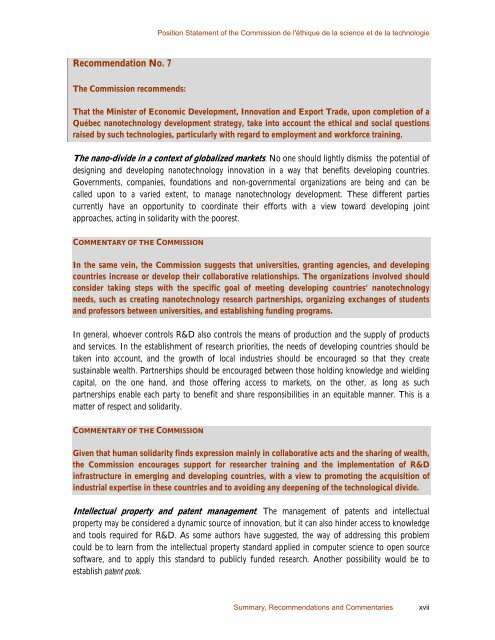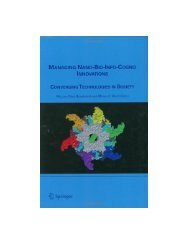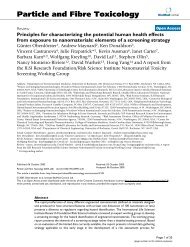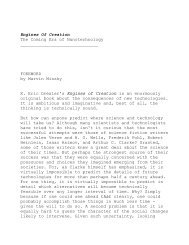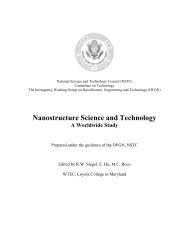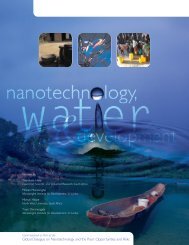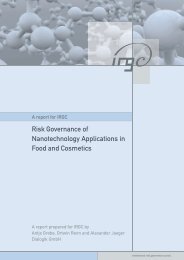A Basis for Action - Commission de l'éthique de la science et de la ...
A Basis for Action - Commission de l'éthique de la science et de la ...
A Basis for Action - Commission de l'éthique de la science et de la ...
You also want an ePaper? Increase the reach of your titles
YUMPU automatically turns print PDFs into web optimized ePapers that Google loves.
Position Statement of the <strong>Commission</strong> <strong>de</strong> l'éthique <strong>de</strong> <strong>la</strong> <strong>science</strong> <strong>et</strong> <strong>de</strong> <strong>la</strong> technologie<br />
Recommendation No. 7<br />
The <strong>Commission</strong> recommends:<br />
That the Minister of Economic Development, Innovation and Export Tra<strong>de</strong>, upon compl<strong>et</strong>ion of a<br />
Québec nanotechnology <strong>de</strong>velopment strategy, take into account the <strong>et</strong>hical and social questions<br />
raised by such technologies, particu<strong>la</strong>rly with regard to employment and work<strong>for</strong>ce training.<br />
The nano-divi<strong>de</strong> in a context of globalized mark<strong>et</strong>s. No one should lightly dismiss the potential of<br />
<strong>de</strong>signing and <strong>de</strong>veloping nanotechnology innovation in a way that benefits <strong>de</strong>veloping countries.<br />
Governments, companies, foundations and non-governmental organizations are being and can be<br />
called upon to a varied extent, to manage nanotechnology <strong>de</strong>velopment. These different parties<br />
currently have an opportunity to coordinate their ef<strong>for</strong>ts with a view toward <strong>de</strong>veloping joint<br />
approaches, acting in solidarity with the poorest.<br />
COMMENTARY OF THE COMMISSION<br />
In the same vein, the <strong>Commission</strong> suggests that universities, granting agencies, and <strong>de</strong>veloping<br />
countries increase or <strong>de</strong>velop their col<strong>la</strong>borative re<strong>la</strong>tionships. The organizations involved should<br />
consi<strong>de</strong>r taking steps with the specific goal of me<strong>et</strong>ing <strong>de</strong>veloping countries’ nanotechnology<br />
needs, such as creating nanotechnology research partnerships, organizing exchanges of stu<strong>de</strong>nts<br />
and professors b<strong>et</strong>ween universities, and establishing funding programs.<br />
In general, whoever controls R&D also controls the means of production and the supply of products<br />
and services. In the establishment of research priorities, the needs of <strong>de</strong>veloping countries should be<br />
taken into account, and the growth of local industries should be encouraged so that they create<br />
sustainable wealth. Partnerships should be encouraged b<strong>et</strong>ween those holding knowledge and wielding<br />
capital, on the one hand, and those offering access to mark<strong>et</strong>s, on the other, as long as such<br />
partnerships enable each party to benefit and share responsibilities in an equitable manner. This is a<br />
matter of respect and solidarity.<br />
COMMENTARY OF THE COMMISSION<br />
Given that human solidarity finds expression mainly in col<strong>la</strong>borative acts and the sharing of wealth,<br />
the <strong>Commission</strong> encourages support <strong>for</strong> researcher training and the implementation of R&D<br />
infrastructure in emerging and <strong>de</strong>veloping countries, with a view to promoting the acquisition of<br />
industrial expertise in these countries and to avoiding any <strong>de</strong>epening of the technological divi<strong>de</strong>.<br />
Intellectual property and patent management. The management of patents and intellectual<br />
property may be consi<strong>de</strong>red a dynamic source of innovation, but it can also hin<strong>de</strong>r access to knowledge<br />
and tools required <strong>for</strong> R&D. As some authors have suggested, the way of addressing this problem<br />
could be to learn from the intellectual property standard applied in computer <strong>science</strong> to open source<br />
software, and to apply this standard to publicly fun<strong>de</strong>d research. Another possibility would be to<br />
establish patent pools.<br />
Summary, Recommendations and Commentaries<br />
xvii


